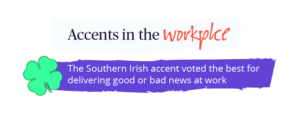
Although our accents are not something we can easily change or control, it’s ultimately a massive part of how we as people are perceived. It’s reported that visual cues are now second to accents in terms of how perceptions are created.
From intelligence to personal perception, accents can be used to draw up false conclusions about a person and despite this being something that usually cannot be controlled it’s something we are all guilty of from time to time.
That’s why here at Moneypenny, we surveyed 1,000 UK office workers to gauge their reactions towards various accents, including British accents and the Republic of Ireland. And the roles these accents were best suited to in the workplace.
We also looked at demographics such as age, region and gender to analyse if there were any patterns in these attitudes towards specific accents and how they were portrayed within the work environment.
Our research revealed that 71% of UK adults agree that accents affect the message and the way it’s delivered. In more detail, 50% of those surveyed somewhat believe in the statement; ‘’someone’s accent affects the message they deliver when they speak’’. Whilst 21% strongly agreed with the statement. Only 2% were at the opposite end of the scale and strongly disagreed. There were also 20% who neither agreed nor disagreed, believing accents not to be important when communicating.
With the majority agreeing with the statement, it’s safe to say although unintentional, we are prejudiced towards certain accents and can make our conclusions on a certain message depending on where the person saying it is from.
But if these accents did impact how we feel then what emotions did they evoke?
Of those surveyed, 17% believed the Southern Irish (Republic of Ireland) accent to be the most calming with Welsh a close second with 12%. Edinburgh (8%) and Northern Irish (6%) accents ranked next in the survey, with 22% of those quizzed believing none of the accents to be the most calming within the workplace.
A whopping 37% believe no accent to be the best at motivating. That left the Geordie accent topping the charts with 9% of the survey voting it as the most motivating accent.
Yorkshire and Geordie accents were also voted as the most encouraging accents in the workplace (both 9%). The least encouraging accent is, according to our survey, the Norfolk dialect.
West Country, Yorkshire, Southern Irish and Norfolk accents were voted as the least annoying accents in the survey at 2% for all four.
Looking into how different accents make their staff members feel provides great insight, but how do these accents compare when it comes to fulfilling roles such as providing news or customer service? In this part of the survey, those asked were allowed to choose three options.
Firstly, the best accent to deliver bad news saw the Southern Irish accent prevail again with 16% of the vote. Followed closely however by Welsh (14%), Edinburgh and Yorkshire (both 12%).
This also yielded a result of 39% voting no accent had a particular effect when it came to delivering bad news, suggesting not everyone is as swayed by accents from particular regions.
The accents that respondents viewed as the best for delivering good news, again, was the Southern Irish accent, Yorkshire and Welsh accents at 17%, 16% and 15% respectively.

A very important aspect of most industries is customer service with the success of many businesses amounting to how well they value and treat their customers.
The survey also delved into what the 1000 UK office workers believed to be the best and worst accents when it came to customer service.
According to the survey results, the best accent for providing customer service is the Yorkshire accent with 17% of the vote. However, Yorkshire just about topped this one with Geordie and Southern Irish right behind with 16% each.
There was however a slight bias when looking at the voting demographics, 50% of the North East voted for Geordie whilst 43% of Yorkshire voted for their accent. Also, 40% of Wales believed none of the accents to be substantially better at providing customer service. As a whole, it would seem most regions backed themselves to provide customers with the best service.

Overall, we believe the survey provided some really valuable insight into the attitudes towards different accents within the workplace, sourced directly from office workers all across the nation.
It’s valuable to see how accents can be interpreted in different ways depending on region, age and gender.
With the huge impact that our accent has on the way we are perceived, we hope that we have increased your understanding of the UK’s perceptions of the different British and Irish accents. As many people continue to switch industries and try their hand at new jobs, we believe they should be treated with dignity and respect, no matter the accent!
If you’re looking for outsourced support for your calls, live chat and more, then consider choosing us as we are the UK’s number one answering service.
We’re also the only provider to give you dedicated people, hand-picked to look after your customers as if they were our own.
Disclaimer
These are the accents that were listed in the survey:
Liverpudlian, Brummie, Glaswegian, Geordie, Northern Irish, Mancunian, Eastender, Welsh, Edinburgh, West country (excluding Bristolian). Bristolian, Norfolk, Yorkshire, and Southern Irish.
Your own PA to look after calls, qualify leads, book appointments, and lots more.
Discover >Our team of PAs capturing every new enquiry and qualifying them during the call.
Discover >